The top 50 most influential Black, Asian and minority ethnic leaders in English health and care – listed alphabetically
Sponsored by
A - F
Kamran Abbasi, editor-in-chief, British Medical Journal
Dr Abbasi is a longstanding feature on HSJ’s list of Black, Asian and minority ethnic leaders, and recent events seem likely to keep him there. He has been BMJ editor-in-chief since 2022, a period which has seen the publication investigate everything from the integrity of trials on blockbuster drugs to publishing calls for the UK to do more about the situation in Gaza. He has also joined other international medical journal editors in criticising how public trust in scientific integrity is being eroded under Donald Trump’s presidency.
Dr Abbasi has worked at the BMJ since 1999, after spending five years working as a doctor in Yorkshire and London. He was critical of the government’s response to the covid pandemic. He is also a visiting professor in the Department of Primary Care and Public Health at Imperial College, a regular broadcaster and writer on cricket, including Englistan: an immigrant’s journey on the turbulent winds of Pakistan cricket.
Lord Victor Adebowale, chair, NHS Confederation

Lord Adebowale’s time as NHS Confederation chair has probably been some of the most tumultuous years in the NHS’s history. It has faced a series of strikes, a growing financial crisis and now a reconfiguration which will have consequences for all the Confederation’s members. Throughout it all, Lord Adebowale has continued to advocate for the NHS’s importance and highlight the inequalities that ethnic minority patients and staff face. In June, he said his mum – a former nurse who died in January – had an “undignified” death and had received “a Black service, not an NHS service”.
He was an NHS England non-executive director for six years and was chief executive of Turning Point, a charity which supports people with complex needs, for 18 years. He became one of the first “People’s Peers” in 2001 and has said he tried to limit his House of Lords’ contributions to speaking when he has something to say and voting on things he understands. He was an NHS Race and Health Observatory founding board member.
Buki Adeyemo, chief executive, North Staffordshire Combined Healthcare Trust
Dr Adeyemo was appointed North Staffordshire Combined Healthcare chief executive in late 2023, having been the interim chief executive for two years before that and medical director from 2012. She is also the chair of the NHS Confederation’s Mental Health Network, which represents both NHS and private providers and also covers learning disability and autism services. The high profile of all of this means she may become a more familiar and influential figure nationally over the coming year.
She joined the NHS in 1997, after qualifying in Nigeria, and has spent most of her career at North Staffordshire Combined Healthcare Trust, which the Care Quality Commission has rated “outstanding”. She is a consultant in old age psychiatry and developed the vascular dementia services for her trust. She has also specialised in medical education and psychological therapies. Her own experience of moving to work in the NHS has made her passionate about supporting international medical graduates as they become established in their new roles.
Foluke Ajayi, chief executive, Airedale Foundation Trust
Ms Ajayi is NHS Confederation vice chair, as well as leading Airedale FT since April 2022. She joined the trust after a period as director of strategic transformation in the Humber Coast and Vale Health and Care Partnership. She has also worked as the University Hospitals of Morecambe Bay FT’s chief operating officer, for the Department of Health and Social Care and NHS Employers, and as a manager at Leeds Teaching Hospitals Trust.
She has said she wants to use her NHS Confederation role to help build a more resilient NHS, using collaboration between organisations to reduce health inequalities and improve outcomes. In 2023, she appealed to the government for funding for a new hospital, saying the current one was “unfit for purpose” and had 200 leaks a year. It’s now in the first wave of the new hospital programme.
Her early career was as a clinical scientist in audiology, specialising in paediatrics and cochlear implants. She has a BSc in cell and immunobiology and an MSc in audiological science.
Duleep Allirajah, chief executive, Richmond Group of Charities
The 10-Year Health Plan could potentially lead to greater charity involvement in the NHS. If so, Mr Allirajah will be one of the people around the table, advocating for the members of the Richmond Group of major charities and for the people they support. He has already been vocal on the government’s neighbourhood health policy and what it will need to do to meet expectations. He will be one of the members of a taskforce set up to oversee the policy and its implementation.
He has worked in policy and campaigning, mainly in the charity sector, for 25 years, including as head of policy at Macmillan Cancer Support.
He has also been assistant director of policy and campaigns at the Royal College of General Practitioners and head of insight and public affairs at the Parliamentary and Health Service Ombudsman.
In his spare time, he is a prolific football writer, writing on social and cultural issues as seen through the prism of sport.
Siva Anandaciva, director of policy, events and partnership, King’s Fund
Few policy wonks get the rapt attention Mr Anandaciva commands – and deserves – when they talk about the NHS. In the last few years, he has become a regular feature on TV and radio with his incisive commentary on NHS changes and finances. As the restructuring of the NHS proceeds and public finances become more strained, he is going to be even busier.
He is also a Barts Health Trust associate non-executive director, as well as sitting on the Office of Health Economics’ policy committee. His previous roles include chief analyst at the King’s Fund, head of analysis at NHS Providers and working on medicines policy and urgent and emergency care in the Department of Health and Social Care.
He has urged the government to be honest with the public about some of the trade-offs the NHS will need to make – putting more money into community care and prevention may mean slightly longer waits for hospital care or even slightly poorer quality care, he has said.
Louise Ansari, chief executive, Healthwatch England
It has been an up-and-down year for Ms Ansari: the Dash review of regulatory bodies is likely to see her organisation’s strategic functions moving into the new patient experience directorate within the Department of Health and Social Care, while local branches’ functions will be absorbed into the work of integrated care boards.
However, Ms Ansari has recently been announced as a non-executive director for NHS England. Whatever happens to NHSE in the next year or so, Ms Ansari, a seasoned campaigner, is unlikely to disappear or to stop advocating for patients. She has led Healthwatch England since 2022, after moving from the Centre for Ageing Better, where she was director of communications.
She has previously held leadership roles for Diabetes UK and Lambeth Council, and as a media specialist at Which?, the Food Standards Agency and the Health Education Authority. She also chairs the finance and outcomes committee of Sussex Integrated Care Board and was the co-chair of one of the 11 advisory groups set up to inform the 10-Year Health Plan.
Avey Bhatia, chief nurse, Guy’s and St Thomas’ Foundation Trust
Ms Bhatia has worked as a nurse for 34 years, with the last five spent as chief nurse of one of London’s leading trusts, where she trained as a critical care nurse early in her career.
She has also worked as chief nurse at Maidstone and Tunbridge Wells Trust and then at St George’s University Hospitals FT, as it then was, in 2017. She has a postgraduate diploma in health services management and a master’s degree in public administration.
She is interim president of the Florence Nightingale Foundation and a trustee of the St John of Jerusalem Eye Hospital Group, which provides eye care in the West Bank, Gaza and Jerusalem. She is part of the board-level advisory team for the Ockenden review into maternity services at Nottingham University Hospitals Trust. Earlier this year, she was awarded an OBE for her services to nursing and the NHS.
Karen Bonner, NHS England London region chief nurse
Ms Bonner moved to the London job last year, after a spell as chief nurse at Buckinghamshire Healthcare Trust – where her mother had once worked as a nursing aide. She has written on the entwined history of Windrush and the NHS – both her parents moved to the UK from the Caribbean in response to gaps in the British labour market.
She says she has always wanted to be a nurse and joined the NHS when she was just 18, later specialising in respiratory nursing and working as a high dependency nurse.
She was a member of the NHS’s Workforce Race Equality Standard strategic advisory group, a trustee at NHS volunteering charity Helpforce, and has worked with Prostate Cancer UK to raise awareness. She has also been closely involved with the Mary Seacole Trust and has said she was motivated by the story of a brave and tenacious nurse who “looked like me”.
Arun Chopra, chief inspector for mental health, Care Quality Commission
The CQC is going through a tumultuous period where it is reverting to having chief inspectors for the key areas it regulates. Dr Chopra has just taken on the task of overseeing the regulation of mental health services with its mix of private and NHS provision. The area is particularly high-profile with an ongoing public inquiry in Essex and some harrowing inquests, highlighting poor care in parts of the sector.
He comes to the post having previously been a consultant in settings in England, New Zealand and Scotland, having qualified in India. He was also the medical director for the Mental Welfare Commission for Scotland between 2020 and 2024. Last year, he was awarded the president’s medal by the Royal College of Psychiatrists, which is given to those making a significant contribution to improving the lives of people with mental illness. His clinical background is in general adult psychiatry with a particular interest in medical law and ethics.
Lord Ara Darzi
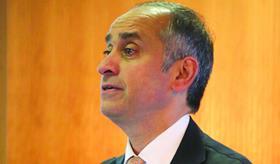
Lord Darzi may have hit the headlines this year for being the victim of a robbery while on holiday in Italy, but his influence on the NHS is likely to be much more long-lasting. As the author of the 2024 report that underlies much of the 10-Year Health Plan, this former government minister has returned to prominence since Labour was elected. He may still be a key player as the NHS reforms and tackles areas of poor care.
Lord Darzi, who is of Armenian heritage, holds the Paul Hamlyn chair of surgery at Imperial College London and pioneered the use of minimally-invasive and robot-assisted surgery in the UK. His interest in global health has led to involvement in applying innovative reforms to health systems across the world. Closer to home, he influenced the development of centralised trauma, acute stroke and heart attack services in London before being appointed a minister in Gordon Brown’s government and producing the next stage review of the NHS in 2008. He now sits as a cross-bench peer.
Salman Desai, chief executive, North West Ambulance Service Trust
Mr Desai became the first ambulance service chief executive from an ethnic minority background last year.
He joined the service as a student paramedic in 1997 and, after seven years in patient-facing roles, moved into management. As well as heading service development in Cumbria and Lancashire, he spent some time getting experience in the acute sector before joining the NWAS board as director of strategy and planning in 2016. In 2022, he was appointed deputy chief executive, later becoming chief operating officer on an interim basis. He was awarded the King’s Ambulance Medal in 2023.
In Cumbria, he led the ambulance service response to the shootings around Whitehaven in 2010 and then the major flooding of several towns a few years later.
He has worked to improve equality, diversity and inclusion within the trust and regionally, being prepared to facilitate uncomfortable conversations on subjects such as misogyny, abuse of power and racism in the workplace.
Vin Diwakar, outgoing national director of clinical transformation, NHS England
Dr Diwakar is one of the NHS England leaders who has made the move into chief executive Sir Jim Mackey’s transition team but has now made the decision to step aside and take up a job as joint chief medical officer at Manchester University Foundation Trust. His role will be crucial in reshaping the NHS in the light of the 10-Year Health Plan.
His directorate’s work at NHSE encompassed delivery on many high-profile programmes, such as the Federated Data Platform, the NHS App and the roll-out of EPRs.
He was previously medical director for transformation in NHSE and, as regional medical director, was a key member of the team leading London’s response to the covid pandemic. A paediatrician by background, he worked as medical director at Birmingham Children’s Hospital and Great Ormond Street Hospital for Children. He was also involved in medical education in the West Midlands. He helped develop proposals for the NHS long-term plan on prevention and health inequalities and contributed to the NHS Constitution.
Jacqui Dyer, mental health equalities adviser, NHS England
Ms Dyer is an independent health and social care consultant who has first-hand experience of mental health services, as well as working with vulnerable groups.
This has led to her being appointed to several national advisory groups, including the ministerial advisory group for mental health, which oversaw the implementation of the national mental health strategy and NHS England’s mental health taskforce, which she co-chaired. She was instrumental in developing the first anti-racism framework for mental health providers, which was published in 2023. She has also been a member of the advisory panel on the Mental Health Act Review, where she co-chaired its African and Caribbean working group.
She is the co-chair of the Thrive London programme, which works towards good mental health and wellbeing for all Londoners, and is a Labour councillor on Lambeth Council, where she is a cabinet member for health and adult social care.
Kevin Fenton, London regional director of public health
Professor Fenton’s career path has taken him from Glasgow to Jamaica and the US and then back to the UK. He came to national attention during the pandemic when he was involved in two reports on the health inequalities faced by minority ethnic communities. He described the pandemic as “shining a light on inequalities”.
He was Public Health England’s national director for health and wellbeing from 2012 to 2017, later joining the organisation’s board. He then additionally took on responsibility for public health in Southwark before becoming London’s regional director.
His earlier career includes being director of the National Centre for HIV/AIDs, Viral Hepatitis, STD and TB Prevention at the Centres for Disease Control and Prevention in the US and director of the HIV and STI department of the UK’s Health Protection Agency. He worked in Jamaica after qualifying as a doctor, having moved there as a child from Glasgow. He was president of the Faculty of Public Health for three years, stepping down this summer. He remains a member of the NHS RHO board.
G - O
Dame Marie Gabriel, chair, NHS Race and Health Observatory
Dame Marie has spent much of her career fighting for marginalised people. As NHSRHO chair, she has supported it in identifying and tackling some of the stark inequities faced by ethnic minorities in health and care.
She has worked extensively in the voluntary sector and local government, as well as taking on chair jobs in the NHS. She is currently chair of the North East London Integrated Care Board but has previously chaired two mental health trusts – East London FT and Norfolk and Suffolk FT.
She is also co-chair of the NHS London People Board, which was set up to implement priorities for the NHS workforce, and is an associate non-executivedirector at the UK Health Security Agency. Her commitment to east London is shown by appointments in sectors beyond health – she is an East London Business Alliance trustee as well as a trustee of the West Ham United Foundation.
Paulette Hamilton, MP
Ms Hamilton has been chairing the Commons health select committee for part of this year while permanent chair Layla Moran is on maternity leave: she is normally the vice-chair. She worked in the NHS, including as a district nurse, and for the Royal College of Nursing for 25 years before she became an MP in a 2022 by-election. She became Birmingham’s first black MP and was re-elected in the 2024 general election.
As acting chair of the select committee, she has led on the scrutiny of the 10-Year Health Plan while saying, in a Parliamentary debate, that the current financial settlement for the NHS is underpinned by a “staggering” £9.1bn in efficiency savings in the final year of this Parliament with “ambitious” assumptions about the speed of transformation. She has also said that the position on social care pay is “both morally unacceptable and economically short-sighted, fuelling the workforce crisis” and called for fair pay for workers in this sector.
She was appointed as the UK trade envoy to the Commonwealth Caribbean earlier this year.
Kamila Hawthorne, chair of council, Royal College of General Practitioners
Professor Hawthorne has led the RCGP since November 2022 – a time of much turbulence, with dissatisfaction with successive governments, the prospect of unemployed recently-qualified GPs and controversy over the use of physician associates/assistants in general practice.
She is passionate about medical education and heads the graduate entry medicine programme at Swansea University. In the past, she was associate dean for medicine at the University of Surrey as it bid for a new medical school and is a former professor of medical education at Cardiff University.
Her clinical interests include health inequalities, including those experienced by BAME patients, and access to health services. She has run community projects in diabetes and heart disease. She has been a GP for 34 years, with 27 of them spent working in South Wales.
She is a trustee of the King’s Fund and chair of trustees for the National Academy for Social Prescribing, which connects people to non-medical activities, groups and services which can improve their health and wellbeing.
Jacynth Ivey, non-executive director, University Hospitals Birmingham Foundation Trust
Ms Ivey is a successful personal coach and consultant, as well as a non-executive director in the NHS.
She spent more than 20 years as a nurse, midwife and health visitor and then a director of nursing and clinical services before setting up her own business. Since then, she has been a non-executive of Birmingham Community Healthcare FT and West Midlands Ambulance Service University FT.
She is passionate about addressing health inequalities, race equity and culture change within the NHS. She admits she had some initial hesitations about taking on the role at UHB FT – which has had a troubled history around key cultural issues – but is now the maternity safety champion and involved in the quality committee and people and culture committee. She recently received an MBE for her services to nursing.
She is a member of the NHS Race and Health Observatory’s stakeholder engagement group and delivered work on the Workforce Race Equality Standards expert programme.
Jinjer Kandola, chief executive, North London Foundation Trust
Ms Kandola has a background in human resources and organisational development. She joined Barnet, Enfield and Haringey Mental Health Trust as chief executive in 2018. The trust achieved its first “good” Care Quality Commission rating the following year.
In 2021, she was appointed chief executive of Camden and Islington FT in addition to her role at BEH, leading to the merger of the two trusts in 2024.
She has stressed the importance of inclusive recruitment in an ethnically mixed area, which also includes some deeply deprived communities. A recruitment campaign – “Someone like me” – has sought to broaden recruitment, including among people with lived experience of mental health issues.
In her earlier career, she worked at Hertfordshire Partnership University FT, where she was deputy chief executive and director of workforce and OD.
She is also a member of the North Central London Integrated Care Board, the NHS RHO mental health advisory group, the NHS Employers policy board and the NHS/DHSC social partnership forum.
Sir Sadiq Khan, mayor of London
Sir Sadiq’s major contribution to public health has been pushing for lower vehicle emissions in London through extending the ultra-low emissions zone across the capital. This has been largely successful, although his stance on other projects, such as the Silvertown Tunnel, has been criticised for potentially adding to car use and emissions.
But in his three terms as mayor of London (he was re-elected in 2024) he has overseen improvements in cycling infrastructure which has led to an uptick in the number of cyclists on many routes and also the introduction of the “Direct Vision” lorry standard which is credited with saving pedestrians’ and cyclists’ lives by improving lorry drivers’ ability to see what is around them.
Before becoming mayor of London, he was the MP for Tooting for three terms and a transport minister under Gordon Brown. He declared a major incident in London during the covid pandemic and retained face mask rules on public transport when the government had abandoned them nationally.
Seema Malhotra, minister for equality and migration
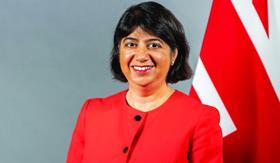
Ms Malhotra’s responsibilities intersect with the NHS at several levels: the emphasis on equality will resonate in an NHS where many staff still feel they are not valued equally, and, as minister for legal migration, she will be important in determining to what extent the NHS remains dependent on staff from overseas.
She has been in Parliament since 2011, when she won a by-election for the Feltham and Heston constituency in north west London. She took on various shadow minister responsibilities – including for preventing violence against women and girls – before resigning in 2016. She returned to the front bench when Keir Starmer was elected Labour leader and she was appointed a minister after the July 2024 election.
Her responsibility for migration means she will need to walk a difficult path between allowing migration which meets skills shortages – such as in the NHS – and for humanitarian reasons, while reducing overall numbers, seen as a key political test for the government.
Kamran Mallick, chief executive, Disability Rights UK
It’s been a busy year for Mr Mallick, who has been prominent in the battle to stop the government’s proposed welfare payment cuts. Although pressure led to cuts to personal independence payments being dropped from the bill, the universal credit cuts were eventually passed.
Mr Mallick has pointed out the already precarious financial situation of many disabled people. But the challenges they face go far beyond this – Disability Rights UK has also campaigned for improved passenger assistance on public transport, for more co-production, and against the assisted dying bill.
Mr Mallick, who contracted polio as a child and is a wheelchair user, has been in the job since 2017 and had previously worked for Action on Disability and the spinal charity Aspire, as well as running a training and consultancy business. He is passionate about improved opportunities for younger disabled people and the need for inclusive education and is on the board of several charitable foundations.
Patricia Miller, former chief executive, Dorset Integrated Care Board
Ms Miller had been Dorset ICB chief executive since its formation, but stepped down in September 2025, having decided not to apply for the role of leading the new clustered ICB.
She says she opted to go into public service through a principle of “giving back” she learned from her parents and did not set out to be a chief executive – she wanted to make a difference to local communities and looked for the jobs which gave her the scope to do that. She has called for ICB leaders to be given more autonomy, citing NHS England wanting to sign off executive job adverts.
She is also vice-chair of NHS Employer’s policy board, co-chair of the provider chairs and CEOs network at the NHS Confederation, and a member of NHSE’s health inequalities oversight group.
In a LinkedIn post announcing her departure from the ICB, she said she had “one regret” from her time in the NHS, which was “that we have made little progress in race and health inequalities. Global majority staff and patients continue to have a significantly worse experience in the NHS”.
Habib Naqvi, chief executive of the NHS Race and Health Observatory
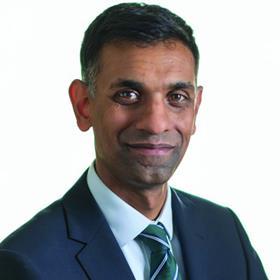
Habib Naqvi has led the NHSRHO since it was set up and has seen its influence grow throughout that time, with its work on identifying and tackling inequalities in healthcare linked to race and ethnicity gaining more attention.
He has led groundbreaking work on tackling inequalities, including in areas such as mental health, sickle cell, maternal and neonatal health, and is co-chair of the independent ethnicity pay gap review in the NHS.
He was formerly interim director of the NHS Workforce Race Equality Standard at NHS England and spent several years working in the Department of Health and Social Care, where he led on national equality and diversity policy.
He joined the NHS in 2001 and managed large public health research programmes in the South West of England. He is a board member at Somerset County Cricket Club.
He was awarded a fellowship through distinction at the Faculty of Public Health in 2023.
Acosia Nyanin, deputy chief nursing officer, NHS England
Ms Nyanin has been deputy CNO since 2023, moving from the South East region, where she was regional chief nurse.
Her background is in mental health nursing, and she has worked as chief nursing officer at Sussex Partnership FT as well as the Care Quality Commission’s head of inspection for adult social care in the central region. She also spent time with the Priory Group, where she was director of quality and professional lead for acute mental health and addictions.
In 2023, she urged nurse leaders to keep a focus on equality, diversity and inclusion in the workplace and protect staff and patients from the “devastating” impact of discrimination.
She has also stressed the importance of supporting nurses with their wellbeing to retain them and enable them to deliver the best care.
She is a trustee for Macmillan Cancer Support, where her clinical expertise and desire to improve outcomes for patients through person-centred care are important to her role.
Wendy Olayiwola, national maternity lead for equality, NHS England
Maternity safety has been top of the agenda in the NHS this year, and the poor experiences and worse outcomes experienced by women of Black and Asian heritage have become ever clearer.
Ms Olayiwola, a midwife for more than 25 years, has been key in delivering plans to improve this. She has helped develop guidance on improving equity and equality in maternity and neonatal care, as part of NHSE’s maternity transformation programme. She is also a professional midwifery advocate in a trust.
But she is also concerned about the environment NHS staff work in and how the behaviour and attitudes of leaders affect them, and ultimately the care they provide. Ethnic minority midwives’ experience at work is not as good as that of their white colleagues, she has pointed out.
As well as nursing and midwifery qualifications, she has an MSc in public health. She is a fellow of the Royal College of Midwives and Nigeria Nurses Charitable Association UK’s president. The World Health Organisation named her as one of 100 outstanding nurse and midwife leaders in 2020.
Karl Munslow-Ong, deputy chief executive, Royal Marsden Foundation Trust
Mr Munslow-Ong moved to the trust in 2018 from Chelsea and Westminster FT where he was deputy chief executive. He joined Chelsea and Westminster in 2015 to oversee the merger with West Middlesex Hospital, where he worked as chief operating officer and then deputy chief executive.
He briefly worked as a management consultant for PricewaterhouseCoopers, before starting his NHS career at Cheshire and Merseyside Strategic Health Authority. He then moved into operational management and has worked at several London hospitals, including Homerton and Hillingdon.
He was one of three Royal Marsden directors who cycled 330 miles from London to Paris in 2022, raising nearly £60,000 towards a new cancer research centre at the trust.
He took part in the next generation directors development programme, run for NHS London, and the top leaders programme at the NHS Leadership Academy. He is also an alternate trustee at the Institute of Cancer Research.
Toli Onon, chief inspector of hospitals, Care Quality Commission
Ms Onon, currently joint chief medical officer at Manchester University FT, will have some big shoes to fill at the CQC, where she has been appointed chief inspector of hospitals.
It’s a crucial role in the CQC’s bid to restore its reputation and build trust among key stakeholders. Previous incumbents have included Professor Ted Baker and Sir Mike Richards, who is now the CQC’s chair.
Ms Toli qualified as a consultant gynaecologist and obstetrician and has continued to do some clinical work, despite her leadership role. She intends to continue weekly clinics when she takes up the CQC role.
The CQC criticised her own hospital’s maternity units in 2023 when it was issued a warning notice. She said she was “disappointed and sorry”.
Much of her career has been spent in Manchester, including as a medical student and resident doctor, before being appointed as a consultant in 2003.
Nnenna Osuji, chief executive officer, North Middlesex University Hospital, and community service chief executive, Royal Free London FT
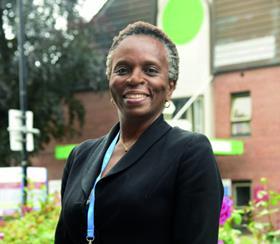
Dr Osuji joined North Middlesex University Hospital Trust as chief executive in 2021 from Croydon Health Service Trust, where she was deputy chief executive and medical director. The trust has since moved into the Royal Free London FT, and she has become chief executive for the hospital, as well as taking on responsibility for community services.
She oversaw the transfer of Enfield Community Services into the trust and the embedding of the “Patient First” system with a focus on visible leadership and staff engagement. She also continues to work as a consultant haematologist. She is co-chair of the London People Board and the London steering group on equality, diversity and inclusion and has also taken on leadership roles on integrated care systems and their forerunners.
She is a trustee of the Nuffield Trust and Tottenham Hotspurs Foundation.
Bola Owolabi, chief inspector of primary and community services, Care Quality Commission
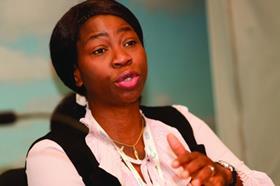
Professor Owolabi has moved to the CQC from her NHS England role as director of the national healthcare inequalities improvement programme. At the CQC, she will lead regulation of some of the most frequently used and high-profile services in the NHS, including general practice and dentistry. She has said she will be drawing on her experience as a GP to ensure the CQC supports the best possible care for patients.
She co-chaired one of the vision workstreams of the 10-Year Health Plan and has said the plan offers a once-in-a-generation opportunity to translate vision and ambition into lived experience. She has a particular interest in reducing healthcare inequalities through integrated care models, service transformation and using data to drive insight. She has led on the CORE20PLUS5 approach to reducing inequalities.
A GP, she was previously national specialty adviser for older people and integrated person-centred care for NHSE.
P - Z
Meghana Pandit, co-national medical director of secondary care, NHS England
Ms Pandit, an obstetrician and gynaecologist by background, left her job as Oxford University Hospitals FT chief executive earlier this year to take up a post in the transition team, which will lead NHSE as it merges with the Department of Health and Social Care. She is on an 18-month secondment so may return to Oxford in late 2026.
She joined the trust in early 2019 as chief medical officer. She was appointed interim chief executive in mid-2022, which was later made permanent. She had previously worked at Milton Keynes University Hospital FT and University Hospitals of Coventry and Warwickshire Trust, where she was medical director and deputy chief executive. Her appointment at Oxford made her the first CEO of colour at a Shelford Group trust.
She has been active in medical education, acting as a course director on an MSc in healthcare operational management at Warwick University and as an associate fellow at Green Templeton College, Oxford, where she has contributed to the management in medicine shadowing programme.
She is also a trustee of NHS Providers and the charity Medical Detection Dogs.
Kiran Patel, chief medical officer, University Hospitals Birmingham Foundation Trust
Dr Patel moved to UHB in March 2024, joining a trust with a myriad of problems and cultural issues, including bullying and a toxic environment in some areas. Changing this is an ongoing challenge, with consultants telling a survey last year that they did not have confidence in the trust’s board. But Dr Patel continues to tackle concerns and has been described as “proactive”.
Dr Patel is a cardiologist by background and worked at University Hospitals Coventry and Warwickshire Trust as chief medical officer and deputy chief executive before he moved to UHB. He has also worked as regional medical director in the West Midlands.
He founded and is chair of trustees for the South Asian Health Foundation charity and is a mentor for the Social Mobility Foundation, supporting students from deprived communities into further education. He was a non-executive director for the BMJ Group for nine years and is now an international editorial board member.
Mumtaz Patel, president, Royal College of Physicians
Dr Patel has the daunting task of leading the RCP out of a difficult period where rows over physician assistants and the inability of some more junior members to influence college policy have seen mounting dissent and an extraordinary general meeting in 2024.
She took up the role in April 2025 following the resignation of the previous president and the publication of a King’s Fund review, which found a lack of trust in the college’s leadership. She has promised to modernise the college and re-establish it as “the voice of our membership and medicine”.
She is a nephrologist in the North West and has been involved in medical education in the region – she is the director of progress and conduct at the University of Liverpool’s school of medicine. She has served as the RCP’s global vice president, launching a women leaders’ programme to support women doctors around the world. She has also been senior censor and vice president for education and training.
Rakesh Patel, chief financial officer and joint deputy chief executive, London Ambulance Service Trust
Mr Patel has more than 35 years’ experience of financial management in the NHS, including leading on the financial case for a new hospital in Epsom and St Helier University Hospital Trust, where he previously worked.
At LAS, he has had to tackle the competing demands of financial stability and meeting response time targets while also tackling issues such as how the ultra-low emission zone affects its vehicles. He was acting chief executive for a short time in mid-2025.
He has worked in different sectors of the NHS in London, including at West Middlesex University Hospital and Barnet, Enfield and Haringey Mental Health Trust. These roles have involved working closely with clinicians, as well as developing new financial models and empowering managers with better information.
He is also a governor of the University of Greenwich and sits on its finance committee. In addition, he is a lifelong Tottenham Hotspurs fan.
Therese Patten, chief executive, Bradford District Care Trust
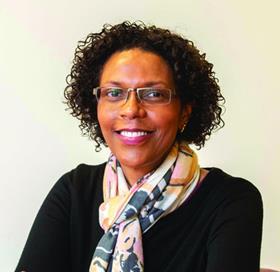
Ms Patten started her NHS career more than 25 years ago. She rose through the ranks to become deputy chief executive and director of strategy at Southport and Ormskirk Hospital Trust before being appointed at Bradford District Care Trust in 2020.
She is also the place lead for the Bradford District and Craven Health and Care Partnership and is the West Yorkshire neurodiversity champion, something close to her heart as one of her sons was diagnosed with autism at a young age. Her trust worked with partners to set up an internship programme for young people with learning disabilities and autism so they could get work-based learning opportunities within the trust.
She also sits on the board of NHS Providers, representing mental health providers.
Before she joined the NHS, she worked on health development in Zimbabwe, Somaliland and Pakistan.
Helga Pile, head of health, Unison
We may be seeing a lot more of Ms Pile over the next few months as industrial disputes in the health service flare up again. As head of health for Unison, she was a regular feature in the media during the last round of strikes. And this year she has warned that health workers feel “taken for granted” and need a better pay rise. Unison is asking its members if they would be prepared to take part in industrial action.
It’s not the only gripe the union has with the NHS; Unison has also been pushing against the establishment of more subsidiary companies to carry out facilities management for trusts and has a long-running campaign to get many lower band staff regraded. Ms Pile has been at the heart of these.
She has worked for Unison since 2006, initially in social care before moving to health. Previous employers include the GMB, the Low Pay Unit and Income Data Services.
Bas Sadiq, chief executive, Homerton Healthcare Foundation Trust
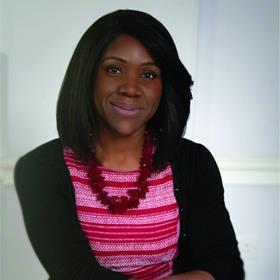
Ms Sadiq started her NHS career as an outpatient receptionist at Whipps Cross Hospital before moving into management. Last year, she was appointed to lead Homerton Healthcare FT. She has said that in her early career, she never thought she could be a chief executive, and there were no role models from her background.
She had been deputy chief executive for less than a year when the previous CEO decided to retire, opening the way for her to take on the job. She has worked in virtually every trust in north east London and grew up in Haringey. She also worked as chief improvement and strategy officer at Dartford and Gravesham Trust for four years.
She is the place-based leader for City and Hackney Health and Care Partnership, which fits into her passion for collaboration between organisations and tackling health inequalities. The anchor role of the Homerton in the local community is something she sees as a lever to improve people’s lives.
Sajan Sathyan, founder, Alliance of Senior Kerala Nurses, and deputy chief nurse, Airedale Foundation Trust
Mr Sathyan founded ASKeN to provide support to nurses who had just moved to the UK and allow those already here to connect and collaborate. One of its key concerns is the lack of role models for those building their careers in the UK, with underrepresentation at senior levels in the NHS, academia and research.
Mr Sathyan’s career has seen him take on various roles at trusts in the North and Midlands since he joined the NHS as a charge nurse in 2009. He has worked as an advanced nurse practitioner and was lead advanced clinical practitioner at Leeds Teaching Hospitals Trust before working for Health Education England. In 2023, he moved to his present job at Airedale.
He qualified as a nurse in Kerala and lectured for some time in India. Once in England, he gained an MSc in nursing. He has been involved in providing pastoral support to internationally educated nurses and served on the chief nursing officer’s international nursing association diaspora group.
Iqbal Singh, chair, Centre for Excellence in the Care of Older People
Professor Singh is pro-vice chancellor at the Institute of Medicine at the University of Greater Manchester as well as a consultant physician in medicine for older people. As chair of the Centre for Excellence in the Care of Older People, he helps to embed dignity, compassion and respect in their care.
He is also passionate about support for doctors in difficulty and those moving into the NHS from overseas, and is chair of the Centre for Remediation, Support and Training. He is a member of the health honours committee, which advises on nominations for honours, and serves on the Cabinet Office’s honours equality and inclusion committee.
His work with the General Medical Council, where he chaired the BME Forum, led him to be appointed, along with a QC, to oversee the review of the Manjula Arora case – a locum GP suspended over a laptop – in 2022. The review stressed the need for the GMC to proactively seek out bias. He later urged it to show greater compassion in its interactions with doctors, patients and referrers.
Swaran Singh, professor of social and community psychiatry, University of Warwick
Professor Singh’s research on mental health inequalities affecting Black, Asian and minority ethnic groups has been groundbreaking but is only part of his extensive academic portfolio, which includes early intervention in psychosis and transition between child and adult mental health services. In 2018, he set up the Centre for Mental Health and Wellbeing Research at Warwick.
He first trained as a surgeon, changing direction when he became involved with human rights groups working with children traumatised by the 1984 Sikh massacre in New Delhi.
He retrained and moved to the UK in 1991, working at universities in Nottingham and London, as well as practising as a consultant. While at St George’s University of London, he developed the ETHOS early intervention service, which improved outcomes for young people with psychosis. He was a commissioner for the Equality and Human Rights Commission and led an independent investigation into discrimination and prejudice in the Conservative Party.
Lade Smith, president, Royal College of Psychiatrists
Dr Smith is the first Black female president of the Royal College of Psychiatrists and is leading it through a period when concerns about the resources devoted to mental health have resurfaced. She has vowed to address the “treatment gap” and to fight for more resources to deliver therapeutic care.
Dr Smith is a consultant psychiatrist at the South London and Maudsley FT, is a member of the NHS RHO board, and lectures at the Institute of Psychiatry, Psychology & Neuroscience at King’s College London. She was deputy chair of the independent review whose recommendations fed into the Mental Health Act White Paper.
She has a particular interest in mental health issues of minority ethnic groups: one of her most influential papers looked at how nearly half of the explanations for higher rates of detention among Black people were based on cultural assumptions and stereotyping. She has also influenced national guidance on the short-term management of violent behaviour and forced injections during restraint, and written extensively on the hormonal and reproductive effects of anti-psychotic medicines.
Richard Stubbs, chief executive, Health Innovation Yorkshire and Humber
Mr Stubbs is passionate about helping the NHS improve patient care through adopting innovations. His role involves working with NHS bodies, academia and health innovators from across the region to support the transformation of the NHS through innovative technologies.
Mr Stubbs is chair of the Health Innovation Network, which brings together the organisations across England. He also co-chairs the NHS Confederation’s BME leadership network and led on the development of pledges for HINs to promote diversity.
He co-authored an influential report on the link between regional productivity and population health and a second one on empowering local places for health and prosperity. He argues that digital health can reduce inequalities and help underserved populations access better health.
In what spare time remains, he manages an under-13s football team.
Ming Tang, interim chief digital and information officer, NHS England
Ms Tang took on the chief digital and information officer role earlier this year alongside her chief data and analytics job in a bid to maintain “stability” ahead of the integration with the Department of Health and Social Care.
She has co-chaired a 10-Year Health Plan working group looking at how the NHS should maximise the impact of data and technology, and has also been closely involved in the introduction of the federated data platform. She has stressed the need “to bring the public with us” on data developments and called for more diversity of thought and background.
She has more than 20 years’ experience of managing and delivering change programmes in big organisations, joining the NHS in 2009 in a commissioning support unit. Previously, she worked for Accenture for nearly 12 years, including stints in Europe, North America and South East Asia. She qualified as a pharmacist before doing an MBA.
Naser Turabi, director of evidence and implementation, Cancer Research UK
Mr Turabi aims to accelerate the adoption of innovative cancer therapies and best practice into the NHS while also reducing inequalities – a challenge at a time when money to invest seems so limited. The high profile of cancer, however, may work in his favour.
He was previously the North Central London Cancer Alliance’s managing director and has led on transformation projects at University College London Hospitals FT. He has spent most of his career in the NHS but was also deputy manager of a Sure Start site.
He has written about the long waits for cancer treatment and the way these disproportionately affect those living in the most deprived areas, people in their 60s and those with co-morbidities. NHS England could hit its waiting list targets around cancer but still have an inequitable system, he has warned.
He is also a trustee on the Skills for Care board.
Selina Ullah, chair, Derbyshire Healthcare Foundation Trust
Ms Ullah has chaired Derbyshire Healthcare FT since 2021, when she was one of the county’s first female Muslim trust chairs. She has brought to the job many years of experience in engaging with diverse populations.
Her previous roles have included working as a regional lead on mental health policy for the National Institute for Mental Health and leading on safer and stronger communities for Bradford Council.
She is also a non-executive director at social enterprise Locala, which delivers NHS-funded community services, primarily in West Yorkshire.
Ms Ullah was a non-executive director at Bradford Teaching Hospitals FT for six years and was vice-chair and senior independent director from 2019. She has been involved in the Muslim Women’s Council for many years and was its chair for 10 years.
She is also a lay board member at the General Pharmaceutical Council and on the board of trustees at NHS Providers.
Patrick Vernon, outgoing chair, Birmingham and Solihull Integrated Care Board
Mr Vernon is one of the few ICB chairs who have a high public profile outside the NHS. He was a broadcaster, public commentator and activist who has featured on a Vogue cover.
He was originally appointed to the board to specifically lead on inequalities and took up the chair’s role on an interim basis, being made permanent in January 2024. However, he has been left without an obvious role as the new ICB cluster – which now includes the Black Country ICB – will be chaired by Danielle Oum.
In the pandemic’s early days, he set up the Majonzi Fund to provide small grants to families from Black and minority ethnic backgrounds who needed bereavement counselling and to hold memorial events after lockdown eased.
He is a former non-executive director of Hertfordshire Partnership University FT, Camden and Islington FT and Healthwatch England.
He was born in Wolverhampton and has played an active part in civic life there, including pushing for a blue plaque for immigrant rights activist Paulette Wilson. This was eventually erected on the Wolverhampton Heritage Centre, the former constituency office of Enoch Powell.
Owen Williams, chief executive, Northern Care Alliance Foundation Trust
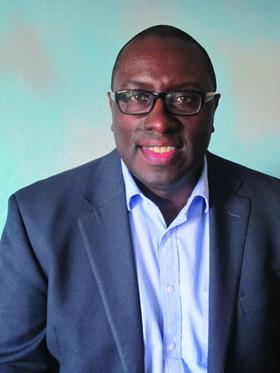
Mr Williams has run the Northern Care Alliance since 2021, following a stint of nearly 10 years running Calderdale and Huddersfield FT. He was previously vice-chair of the NHS Confederation and has taken on various national roles, including chairing the National Health Inequalities Expert Advisory Group and advising NHSX on digital planning for the future.
He is committed to reducing health inequalities in the trust’s area, which includes many deprived populations. His time at NCA has been challenging, with protestors entering a board meeting to complain about pay and having to deal with a high-profile case of a spinal surgeon whose conduct had led to staff concerns.
His background is in local government, having led Calderdale Metropolitan Council – before moving to its local trust – and Rossendale Borough Council. In 2020, he received a doctor of business administration degree from the University of Huddersfield.
Jason Wong, chief dental officer, NHS England and Department of Health and Social Care
Dental services remain extremely high profile and high risk for any government; Dr Wong has the challenging task of improving access to dental services within a tight budget while also pushing for better prevention.
He has said community-based programmes are essential to building good oral health – including supervising brushing for children – and has advocated increased use of dental therapists and dental hygienists as part of dental teams to relieve pressure on dentists.
He was deputy chief dental officer from 2020 until 2023, when he took over as interim CDO, later being made permanent. He has maintained his clinical practice in Grantham, Lincolnshire, despite the demands of his national role, and is also a clinical ambassador for the Mouth Cancer Foundation.
He was secretary of the Lincolnshire Local Dental Committee for 16 years and has chaired local dental networks across parts of the Midlands and East of England.
Salma Yasmeen, chief executive, Sheffield Health and Social Care Foundation Trust
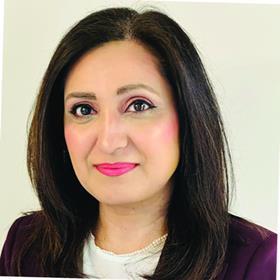
Ms Yasmeen was appointed chief executive at Sheffield in 2023, moving from South West Yorkshire Partnership FT, where she had been deputy chief executive and director of strategy and change.
She also spent nearly five years working in healthcare in Saudi Arabia, including as a director of nursing services and transformation consultant. She set up Bradford-based Sharing Voices, a health charity which works in partnership with the NHS to support diverse communities with their mental health.
She has led on equalities policy work across systems in Yorkshire and London and has said that women in senior leadership roles may be more attuned to health inequities, especially those which affect women and children. The NHS still needs to do more to create a level playing field for them, she argues, including recognising the impact of their other commitments.
She qualified as a nurse before getting qualifications in counselling and communications.
The 50 most influential Black, Asian and minority ethnic people in health: Full list
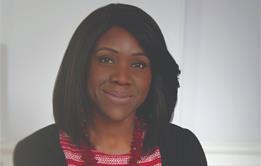
The top 50 most influential Black, Asian and minority ethnic leaders in English health and care – listed alphabetically
 Currently
reading
Currently
reading
The 50 most influential Black, Asian and minority ethnic people in health: Full list
- 2
- 3
- 4
- 5
- 6





































